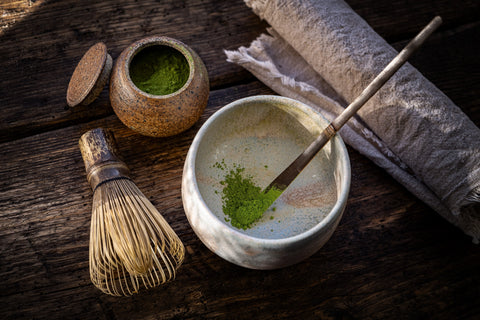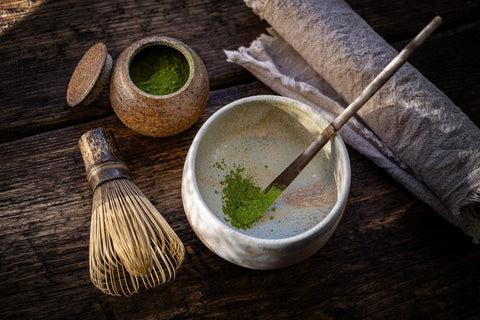
Matcha has earned its place in the wellness spotlight — not only for its unique flavour and calming energy, but also for its potential role in supporting weight management.
From boosting metabolism to improving fat oxidation during exercise, research suggests that matcha can be a valuable addition to a healthy weight loss plan. But how does it actually work, and what should you expect? Let’s break it down.
1. Matcha Can Boost Metabolism
Matcha is naturally rich in catechins, particularly EGCG (epigallocatechin gallate) — an antioxidant known to enhance thermogenesis, the body’s rate of burning calories.
A landmark study by Dulloo et al. (1999) found that green tea extract rich in catechins and caffeine increased 24-hour energy expenditure and fat oxidation in humans by 8–10%, even at rest. This isn’t a magic bullet, but over time, that small increase in calorie burn can make a difference when combined with a balanced diet and regular exercise.

2. It May Enhance Fat Oxidation During Exercise
One of the most cited benefits of matcha for weight management is its ability to improve fat oxidation — the body’s process of breaking down fat for energy.
Venables et al. (2008) showed that consuming green tea catechins before moderate-intensity exercise increased fat oxidation compared to a placebo. Similarly, Ichinose et al. (2011) found that combining exercise with catechin intake significantly boosted fat burning during workouts.
This means drinking matcha before exercise could help you get more out of your training sessions.
3. Provides Sustained Energy Without the Crash
Unlike coffee, which can cause energy spikes followed by crashes, matcha delivers a steady release of energy thanks to the combination of caffeine and L-theanine.
Bryan (2008) noted that L-theanine works synergistically with caffeine to improve attention and alertness, while reducing the jitteriness often associated with coffee. This makes it easier to stay active throughout the day — whether that’s working out, walking more, or avoiding the sluggishness that leads to skipped workouts.
4. Supports Appetite Control
Matcha’s L-theanine content doesn’t just promote calm focus — it may also indirectly help with appetite regulation. Research by Kimura et al. (2007) found that L-theanine reduced both psychological and physiological stress responses, which can help minimise stress-related eating.
While matcha isn’t a direct appetite suppressant, replacing high-calorie snacks or sugary drinks with a cup of matcha tea or latte can lower daily calorie intake without feeling deprived.
5. Helps Reduce Liquid Calories
Many people consume extra calories without realising it through sweetened drinks like sodas, bubble tea, or sugary coffee beverages.
A meta-analysis by Malik et al. (2010) linked sugar-sweetened beverage consumption with significant weight gain in both children and adults. Replacing these with unsweetened matcha tea can be an easy, sustainable way to cut excess calories and sugar.
6. Matcha’s Detox and Digestion Support
Matcha’s high chlorophyll content may support the body’s natural detoxification processes and aid digestion, which can reduce bloating and improve overall gut health (Ferruzzi & Blumberg, 2015).
While detox claims should be approached cautiously, a healthy digestive system can play an indirect role in maintaining a healthy weight.
7. Realistic Expectations
It’s important to note that matcha is not a standalone weight loss solution. As Hursel et al. (2011) point out in their meta-analysis, the effects of green tea catechins on weight loss are most effective when combined with:
-
A balanced, calorie-appropriate diet
-
Regular physical activity
-
Adequate sleep and stress management
Think of matcha as a supportive tool — a drink that can enhance your results when you’re already practicing healthy lifestyle habits.
 How to Use Matcha for Weight Support
How to Use Matcha for Weight Support
-
Timing matters: Drink matcha in the morning or 30–45 minutes before exercise for maximum fat oxidation benefits.
-
Keep it clean: Avoid adding excessive sugar or cream that can counteract its benefits.
-
Stay consistent: 1–2 servings per day will help maintain its metabolic effects.
Scientific evidence suggests that matcha can support weight management by boosting metabolism, enhancing fat oxidation during exercise, providing sustained energy, and helping reduce liquid calorie intake.
While it won’t replace the need for healthy eating and regular activity, matcha is a functional, enjoyable beverage that can fit naturally into a weight-conscious lifestyle.
At Forest Cloud, our ceremonial and premium matcha is shade-grown, stone-ground, and packed at origin to preserve its nutrients and flavour — giving you both wellness benefits and a rich, authentic taste.





